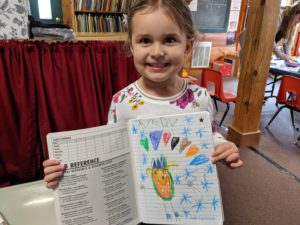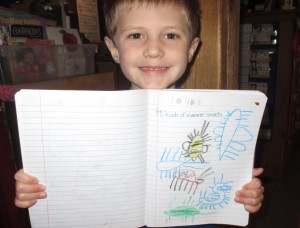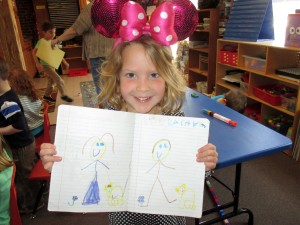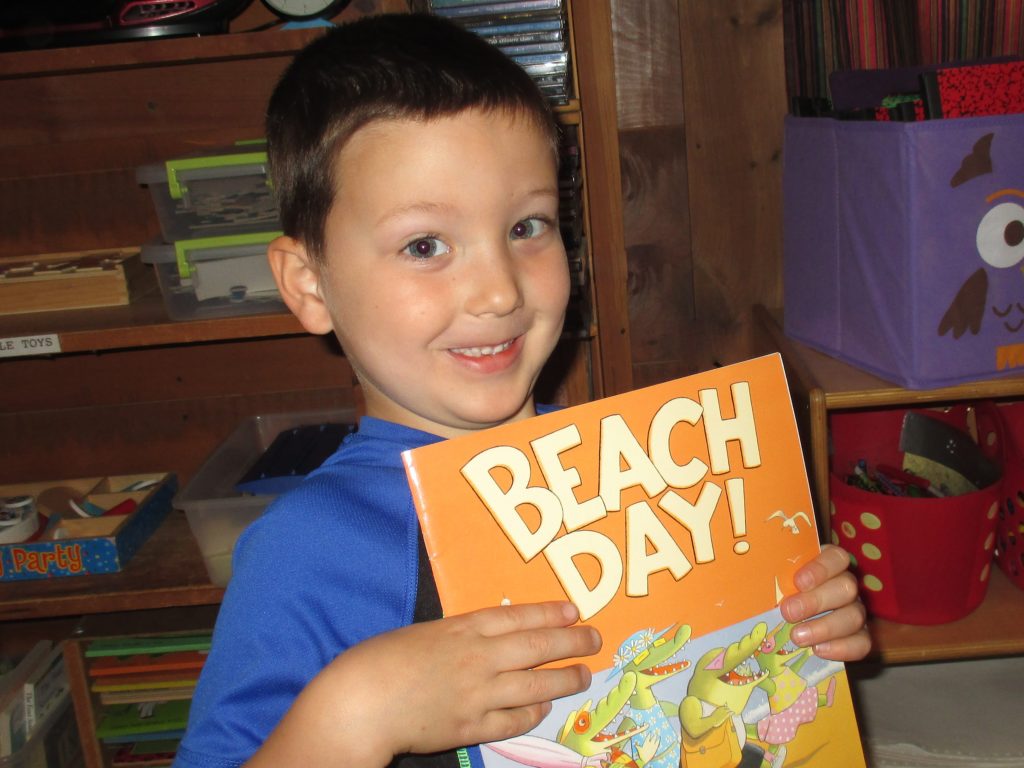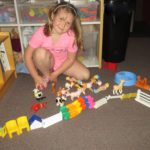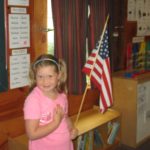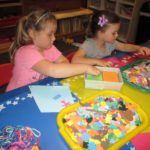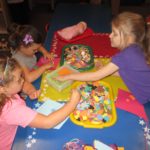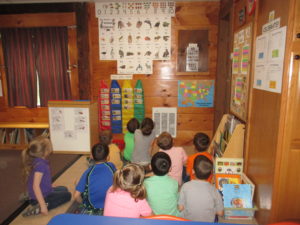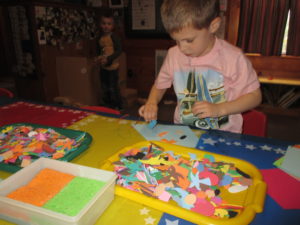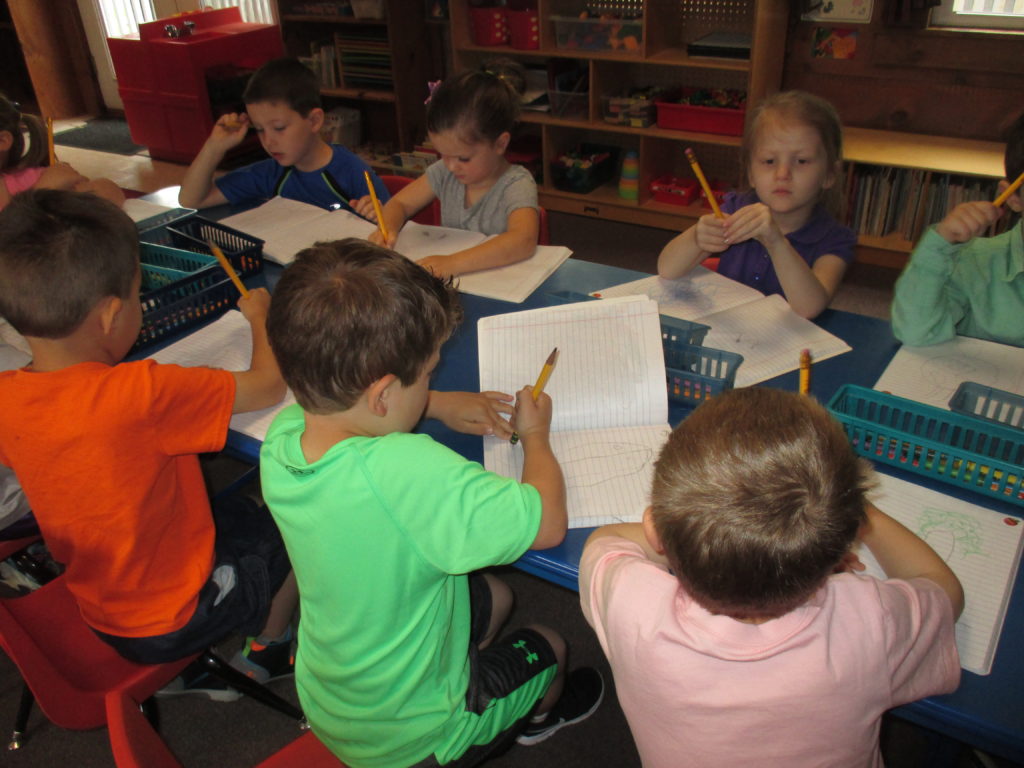The pillars of Hogarth’s early literacy curriculum include the Agenda, storytime with pre- and post-reading discussions, and Tweeting. (In late 2022 we transitioned from Tweeting to Peeping. You’ll find more information on that here.) With the addition of journaling and reporting, our early literacy curriculum is unparalleled.
The children journal most weeks starting in late fall. The journals are an outlet for self-expression, but also serve as a vehicle to work on letters and letter sounds, and numbers and their functions. The children often dictate text for me to add to their drawings. The next blank page in the journal is marked in the corner with a little sticker. This allows the children to find the page for their next journal entry. They know the blank stickered page is their journal page for the day. I created a playlist with writing-related songs to play while the children journal. The children write as long as the music plays in the background. When the music is done, they can be finished. Having a “frame” for the activity encourages children to take a deeper dive, but there are always children who want to work beyond the alloted time. Cries of, But I’m not done! ring out when the music stops. We always offer them a work space in which to continue their journaling. Journals are sent home when a child “graduates” from Hogarth, so some children will work up to three years on their Journal. It is always fun and informative to see the developmental progression of the children’s work as they move through their school year(s).
The children start filing reports in late September or early October. What are reports? They are accounts of activities your child participated in on a particular day which are collected from all the children and published weekly as The Highlights. They are dictated to me by your child. I read it back to the reporter who then edits for detail or clarification before they approve the final report. If your child held the flag for the Pledge of Allegiance, they will be the flag reporter. If they are the Mystery Kid, they will report on the Agenda. Children report on the books we read, songs we sing, art projects we do, playtime adventures, and all the other bits and pieces that make up a preschool day at Hogarth. A child typically reports once each week, but there will be days or weeks when our activities or unforseen time bandits will not allow reporting. If your child or child’s class doesn’t report one week, they probably will the next. The same goes for peeping, which sometimes falls prey to time bandits, as well.
How do I explain the concept of reporting to the children? I tell them they are my Hogarth reporters. I explain that reporters bring news to people. They tell people about events those people did not witness. Since they’re the only ones to go to Hogarth in their families, it’s up to them to report the Hogarth news for their families to read at home.
I explain the difference between Reporting and Peeping. Reporters report the facts of that one particular school day. Peepers write about anything their hearts desire.
Reporting impacts the children’s early literacy skills in a big way. Questions and prompts from me give direction and clarification to the reporting process. Going over the events of the day in their minds, pulling out those bits of information they feel are important, and then articulating their thoughts in such a way that the reader gets a full picture is going to sharpen their powers of observation and make them more mindful of the unfolding school day. Thinking over the day also gives the children an opportunity to review the material we covered. Listening to their responses lets me know if I presented the material clearly enough to be understood.
As a teacher, I love hearing the children retell the stories we read each day. It lets me see how much of a connection there is between the children and the stories. As a writer, I love hearing what the children take away from the stories. What “speaks” to them. I look to see what works in a story and what falls flat. I find inspiration for my writing in their reporting!
The children’s reports are written verbatim. I want each child to have his or her own authentic voice. I think you’ll find these Highlights reports great fun to read. Here are a few samples reports:
Logan: We read a soft cover book and it was called Beach Day! (Italicized print that follows is Logan reading directly from the book.) “Hot!” said Sam. “Sunny, ” said Pam. “Sweaty,” said Will. “Swim?” said Jill. “Beach!” said Sam, Pam, Will, and Jill. They decided to go to the beach and they were going to play because they saw a park. And they pedaled up and down and under and even through a mountain of clover. And then one said, “Picnic.” “Sandwich,” said Sam. “Pasta,” said Pam. “Pickles,” said Will. “Burp!” said Jill. They napped and then they slept past 1 and they slept past 2 and they slept past 3 and they slept past 4. “Let’s go!” said Sam. “But where?” said Pam. “Over there!” said Will. That hill?” said Jill. “Push!” said Sam, Pam, Will, and Jill. “Beach!” said Sam, Pam, Will, and Jill. They swam by the light of the moon.
Hazel: We made kites. Miss Vicki put the string on for me and I got the same thing as Alba. The same thing, but not the same size. Actually, it is the same size. I put an aqua flower on it and a bunch of stuff on it. I did holding the flag and we did Pledge of Allegiance together with Miss Murphy and Miss Vicki. I played in the yard over there at the end of Miss Murphy’s desk. I put animals in it and I made a huge yard!
Jackson: We had bananas and crackers and apple juice and water. We learned about mammals on the Animal Alphabet. Mammals have hair or fur and they make milk for their babies. We found even and odd numbers. (By counting the numbers of mammals, birds, reptiles, and insects in the Animal Alphabet.)
Alba: I wrote LAFNT in my Journal. It’s called Kid Spelling. I drew a picture of an elephant in my Journal. I did a Tweet.

